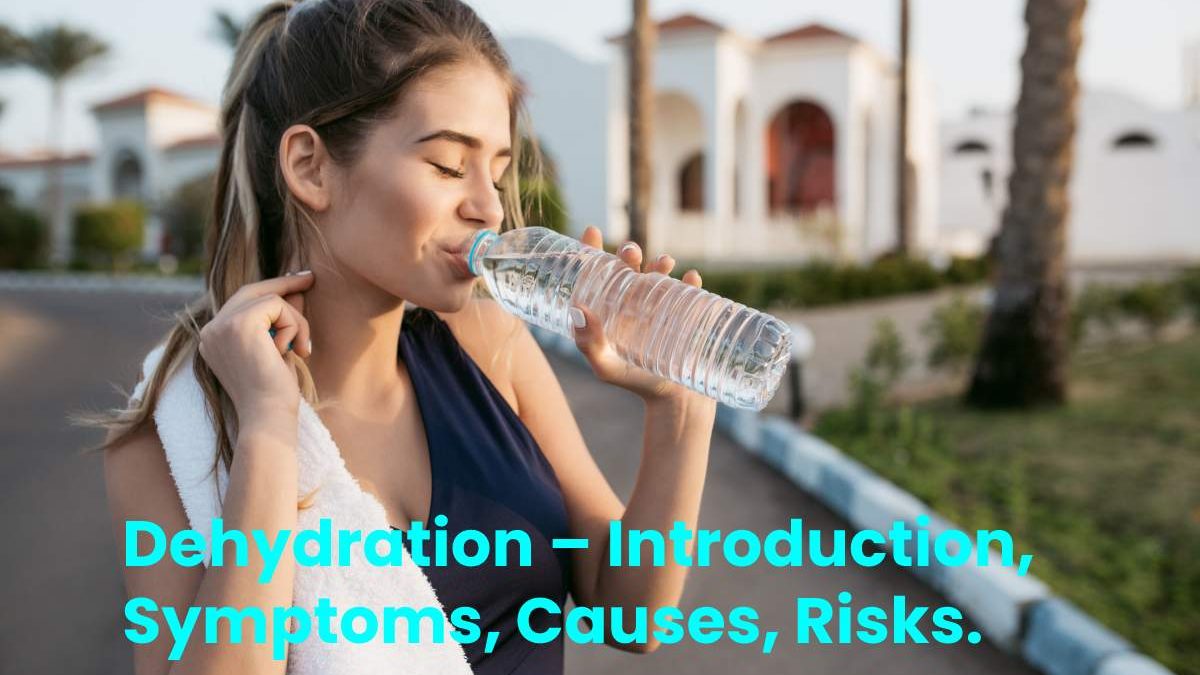Table of Contents
Introduction
Dehydration happens when you use or lose more fluid than you take in, and your body does not have sufficient water and other fluids to carry out its normal functions. If you don’t replenish the fluids you have lost, you will become dehydrated. Anyone can become dry, but this condition is hazardous for children and the elderly.
The most common reasons for dehydration in children are severe diarrhoea and vomiting. Older people naturally have a lower volume of water in their bodies and may have illnesses or take pills that increase their risk of dehydration.
Even minor illnesses, such as infections that affect the lungs or bladder, can cause dehydration in adults.
Symptoms – Dehydration
There is not always a reliable early indicator of the body’s water needs. Many people, especially older people, do not feel thirsty until dehydrated. That’s why it’s essential to increase your water intake when it’s hot, or you’re sick.
Symptoms and signs of dehydration can also vary by age.
- Infants or young children
- dry mouth and tongue
- cry without tears
- No wet diapers for three hours
- Sunken eyes and cheeks
- Irritability
- Adults
- But excessive
- Less frequent urination
- dark-coloured urine
- Tired
- dizziness
- When to consult a doctor
- Having had diarrhoea for 24 hours or more
- they are irritable or disoriented and much more sleepy or less active than usual
- They can’t hold any liquids
- Having blood in the stool or dark stools
Causes – Dehydration
Sometimes dehydration happens for simple reasons: you don’t drink enough because you’re sick or busy or don’t have access to clean water when travelling, hiking, or camping.
Other causes of dehydration include the following:
Diarrhoea or vomiting. Severe, severe diarrhoea (diarrhoea that comes on suddenly and violently) can lead to massive harm to water and electrolytes in a quick time. If you are vomiting with diarrhoea, you lose even more fluids and minerals.
Fever. The problem gets worse if you have a fever in addition to diarrhoea and vomiting. In general, the higher the madness, the greater the degree of dehydration.
Excessive sweating. You lose water when you sweat. You sweat more and lose more fluid if it’s hot and humid. If you engage in vigorous physical activity and don’t compensate for fluids during this time, you can become dehydrated.
Increased need to urinate. Certain medicines, such as diuretics and some blood pressure medications, can cause dehydration, usually increasing the need to urinate.
Risk factor’s
Anyone can become dehydrated, but some individuals are more at risk:
Babies and children. Because they are the most prone to diarrhoea and vomiting, infants and children are particularly vulnerable to dehydration. Since a child’s body surface area relative to their weight is greater than that of an adult, children also lose a more significant proportion of fluid in case of high fever or burns. Young children often cannot tell you when thirsty or drink a glass of water independently.
Older adults. As you age, your body’s fluid supply decreases, your ability to retain water decreases, and your sensation of thirst becomes less acute. Older people may also have mobility problems limiting their ability to collect water—these problems are exacerbated by chronic conditions such as diabetes and dementia and certain medications.
People with chronic diseases. Having uncontrolled or untreated diabetes increases the risk of dehydration. Kidney disease also increases risk, as do medications that increase urination. Consuming a cold or sore throat makes you more vulnerable to dehydration because you feel less like eating or drinking when you’re sick—people who work or exercise outdoors.
Complications – Dehydration
Dehydration can lead to severe complications, such as the following:
Heat injury. If you don’t drink sufficient fluids when you’re physically active and sweat a lot, you can get heat injuries. The severity of this injury can cause a variety, from mild muscle cramps to life-threatening heat exhaustion or heatstroke.
Kidney and urinary problems.
Prolonged occurrences of dehydration can cause urinary tract infections, kidney stones, and even kidney failure.
Seizures Electrolytes, such as potassium and sodium, help carry electrical signals from one cell to another. If your electrolytes are out of stability, the standard electrical signal can be confused, leading to involuntary muscle shudders and loss of consciousness.
Low blood volume shock
It is one of the most severe complications of dehydration and can be life-threatening. It occurs when low blood volume leads to a decrease in blood pressure and the quantity of oxygen in your figure.
Prevent
To prevent dehydration, drink fluids amply and eat water-rich foods, such as fruits and vegetables. Allowing thirst to be your guide is an adequate daily schedule for most healthy people.
People may need to drink more fluids if they have conditions such as:
Vomiting or diarrhoea. If your child has vomiting or diarrhoea, start giving more water or oral rehydration solution at the first signs of illness. Don’t wait for dehydration to set in.
Active exercise In general, it’s best to start hydrating the day before. During the activity, fill up on fluids at regular intervals and continue to drink water or other liquids when done.
Consequences of prolonged dehydration on the general state:
- Urinary tract infections due to a higher concentration of urine
- Constipation
- Fatigue or tiredness
- falls
- Pressure ulcers
- Headache
- hypotension
- Drowsiness
- Disorientation
- Coma in the most severe cases
Consequences of dehydration on swallowing:
Decreased production of saliva that favours the appearance of infections in the mouth
Difficulty in preparing the food bolus due to lack of salivation
Gingivitis and canker sores due to alterations in saliva
aspiration pneumonia
Conclusion
Hydration is essential, inside and outside the body. 60% of our body is made up of water, being the essential nutrient of our organism. Drink 2.3 litres of fluid per day to protect yourself from developing health problems. Being dehydrated, even at a level of 2% or less, can interfere with mental activity, the ability to think, the ability to approve, and the feeling of well-being. It can also affect physical activity. You may not feel as active. In short, it affects driving activity, anything that has to do with the need to stay hydrated. So there are harms that people are not aware of, but there are still medical professionals keeping people on their toes for proper hydration.


